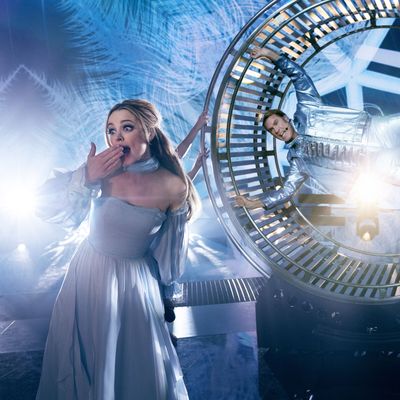
The Will Ferrell Sad Walk is a thing of tragicomic beauty. A shambling retreat made somehow more pathetic by the star’s awkward physique, it often appears at the top of the third act in his movies, right after everything — and I mean everything — has gone horribly wrong. It’s all part of Ferrell’s crypto-adolescent charm. Those flattened, great stone lips of his seethe eloquently with childish despair. But we feel for him, too, for if there is one great elemental truth to be found in le cinéma du Will Ferrell, it is this: That the most delusional and imperiously confident among us are also the ones who fall the lowest, and the hardest. And the actor is an ideal vessel to convey this idea, because he commits so hard in either direction. He can be as inconsolable as he can be overbearing.
Ferrell perfected that persona in early hits like Talladega Nights and Anchorman, and he returns to that well with David Dobkin’s Eurovision Song Contest: The Story of Fire Saga, a new Netflix comedy in which the actor plays a long-haired Icelandic dreamer with visions of triumphing at the titular pop competition. Ferrell’s Lars Erickssong is an overgrown (and probably too old) adorable loser from a small fishing village who, along with his singing partner and probable soul mate Sigrit Ericksdottir (Rachel McAdams), gets a once-in-a-lifetime chance to compete at Eurovision after a fortuitously tragic boat explosion does away, King Ralph style, with all the other Icelandic contenders. After arriving at the host city of Edinburgh, the duo, who call themselves “Fire Saga,” deal with their own messy feelings for each other — complicated by the possibility that they might be siblings, since Lars’s handsome fisherman father Erick (Pierce Brosnan) has secretly sired a good number of their town’s offspring — while trying to perfect their sure-to-be-disastrous musical number. They also attract the possibly amorous attentions of two other contestants, flamboyant Russian star Alexander Lemtov (Dan Stevens) and the seductive Greek diva Mita (Melissanthi Mahut). Interestingly, Lemtov and Mita seem fascinated by Lars and Sigrit not for sinister reasons, but because these worldly pop veterans see something in our heroes that maybe they themselves (and possibly we) initially do not.
There’s not much to spoil, broadly speaking. You know where the film is headed. But even so, Eurovision gives us an inspired and hilarious match between subject and stars, all driven by melodrama: The glorious, over-the-top theatricality of the song contest makes an ideal stage for Ferrell’s brand of high-highs and low-lows. (To become a pop deity, to triumph over those who doubted you while belting out infectious, highly danceable chart-toppers — I mean, who doesn’t want that?) And McAdams’s sunny, slightly off-kilter sincerity counterbalances and informs Ferrell’s extremes: We can’t always tell if Sigrit plays along with Lars because she loves him so much, or if she really is that guileless. She enables his delusions, even though she’s the one with the real talent.
As for Eurovision itself, Dobkin & Co. (including executive music producer Savan Kotecha, an actual, honest-to-goodness hit-maker) have created a vivid, joyous approximation of the real thing, with songs and performances that are simultaneously so catchy, beautiful, and ridiculous that I would have happily watched another six hours of this. (Don’t be surprised if you find yourself disappearing down various Eurovision-related rabbit holes on YouTube after viewing the film. This is, I assure you, an extremely healthy and productive use of your time.)
The filmmakers don’t have to lean too hard into the silliness. Instead, they can just let the brazen alchemy of international pop spectacle take its natural course; all the numbers in the picture feel plausible, and much of them are clearly inspired by real performances. A Belarusian heavy-metal outfit in demonic makeup pays tribute to actual 2006 Finnish Eurovision winners Lordi (whose “Hard Rock Hallelujah” is an all-time banger). A bizarre dance extravaganza involving Will Ferrell in a giant hamster wheel comes straight from Ukrainian singer Mariya Yaremchuk’s amazing 2014 performance, which is only slightly less insane than anything in this movie. Lemtov’s showstopping, operatic delivery of an irresistibly nutty song called “Lion of Love” recalls the surreal, did-I-dream-that magnificence of 2013’s Romanian dubstep vampire-soprano-god Cezar. Previous contestants show up in cameos, most notably in a centerpiece “song-along” sequence in which former winners like Sweden’s Loreen, Austria’s Conchita Wurst, and Israel’s Netta join the cast in a lively medley of hits that include Cher’s “Believe,” Madonna’s “Ray of Light,” and ABBA’s “Waterloo” (which won Eurovision in 1974).
That Eurovision the movie comes so close to replicating Eurovision the song contest turns out to be a savvy move, as the real-life event’s pandemic-related cancellation now means the film can serve as something of a substitute. More importantly, however, it crystallizes Ferrell and McAdams’s antics. Once we ourselves are immersed in this intense, extravagant, colorful milieu, we can understand how someone can spend their whole life fantasizing about being a part of it — and how crushing it would be to fail. Appropriately, we glory in every high note, and, yes, we feel every agonizing step of the slow walk back. And in that kind of heightened atmosphere, even the weak jokes land. I can’t quite believe I’m putting these words in this specific order, but Eurovision Song Contest: The Story of Fire Saga might be the most emotionally engaging movie Will Ferrell has ever made.
More Movie Reviews
- The Accountant 2 Can Not Be Taken Seriously
- Another Simple Favor Is So Fun, Until It Gets So Dumb
- Errol Morris Has Been Sucked Into the Gaping Maw of True Crime


